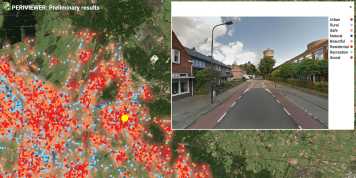Measuring ‘place’ - the first puzzle piece in fostering place-making in the urban-rural gradient
End of 2020 saw the successful completion of the largest survey conducted at PLUS to date: 10’000 residents in the Netherlands offered their valuations on how they feel about over 7’000 different places they can experience day to day in typical Dutch landscapes.

“This is a good spot to relax”
“Well, I think it’s rather boring…”
How we feel about different places can influence how we act and relate to such places - either by wanting to take care and preserve neighbourhoods, or by abandoning and neglecting them. This people-place dynamic is referred to as place-making and shows promise as a way of fostering positive sustainable transformations.
Until recent advancements in computational and data collection capabilities, a systematic study of place-making has been challenging. The survey aims to address the issues of valuing place and place-making from a person’s perspective; it was conducted as part of the Globescape project and asked a representative sample of 10’000 people residing in the Netherlands to rate and describe over 7’000 locations in the Dutch region of Utrecht.
The first data analysis shows promising results, replicating findings of similar studies. However, the large scope of the dataset allows for new ways of looking at how places are formally and spatially defined allowing to unearth hidden patterns of the multifunctional urban-rural gradient. Therefore, we are looking forward to adding new insights in this field of research over the course of 2021!